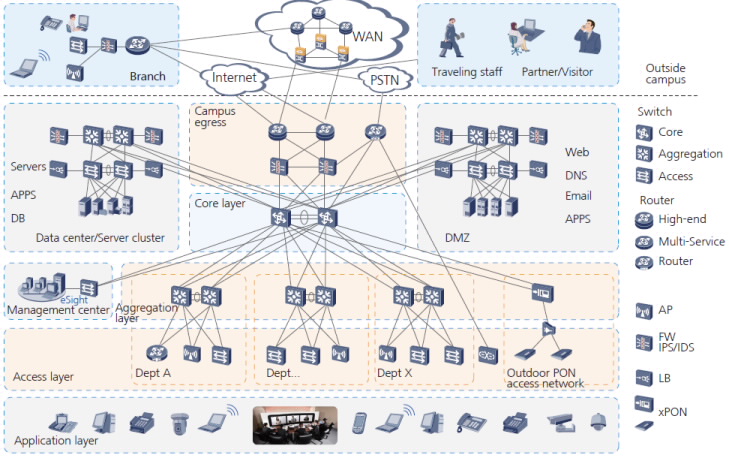Every enterprise must strike a balance between efficiency, cost, and user experience. As enterprises expand geographically and as new ways of doing business emerge, more and more enterprise services originate in the cloud and are carried across the Internet. As a result, campus networks have to adapt to support different user models and service models. Campus networks must also adapt to the increase in number and diversity of devices that are connected to the network. A modern campus networks needs to move beyond connection PC’s to PC’s to connecting people to people, people to machines and machines to machines. Enterprises require higher mobility, security, and quality of service across their campus networks. However they cannot meet these needs without considering both equipment costs as well as ongoing costs associated with operations and maintenance.
Enterprises need to provide users access to network services from anywhere, anytime, and using any device without compromising security. The campus network should provide an excellent user experience for a wide number and variety of services.
A campus network is logically divided into five zones: core network zone, data center zone, DMZ, egress interconnection zone, and O&M zone. Huawei campus network solution focuses on the core network zone. The core network zone uses a typical 3-layer architecture consisting of the core layer, aggregation layer, and access layer. This 3-layer architecture has the following advantages:
- Multi-layer design: Each layer has clear functions and a stable topology, making the network easy to expand and maintain.
- Modular design: Each module corresponds to a department, facilitating fault location. Network topology changes in a department do not affect other departments.
- A two-node redundant design enhances network reliability. Too many redundant nodes are difficult to maintain.

Campus network architecture
Huawei campus network solution applies to various scenarios, such as dense user access, mobile office, VoIP, videoconference and video surveillance, access from outside the campus network, and all-round network security. This solution meets customers' requirements on network performance, scalability, reliability, security, and manageability, while also simplifying network construction. Huawei campus network solution brings the following benefits:
- A Ubiquitous Network for All Services
Huawei campus network solution helps build a ubiquitous network that provides access for any devices, anywhere, any time.
- A Secure Network to Guarantee Data and Service Security
Huawei campus network security covers terminal security management, service security control, and network attack defense.
- An Intelligent Network to Facilitate O&M
Huawei campus network solution provides intelligent power consumption management, intelligent fast network deployment, and intelligent network maintenance.
Huawei campus network solution uses open protocols and supports a wide variety of industry standards to help enterprises leverage their current network investments. Huawei offers a very broad set of products, solutions and services both direct to enterprises as well as with partners to support both large and mid-sized enterprises.

